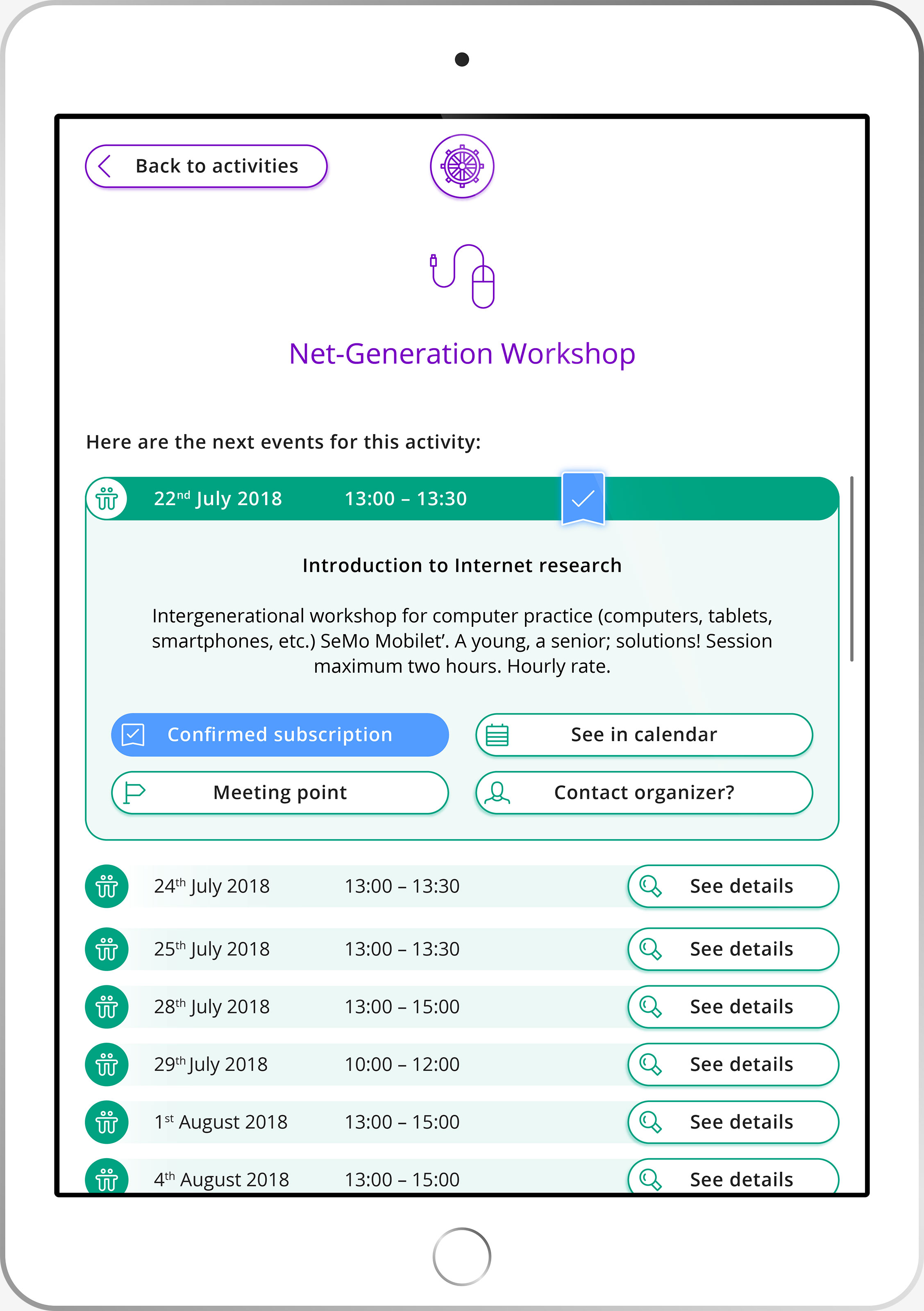PROJECT
Studies show the desire of older people to maintain an active social life. They also indicate the major impact of loneliness on health. Based on this acknowledgment, Solidarity Network explores how digital technology can improve social connections in real life and gives guidelines to design user-friendly interfaces for seniors. An inclusive approach that benefits all generations.

Contrary to common opinion, observations, interviews and co-creation work with more than 80 older people indicates that they are very much capable of getting to grips with new technology. Barriers to adoption are more related to trust, belief and meaning of the services.
The project is carried out in collaboration with Pro Senectute, which has developed Quartiers Solidaires, a complete methodology to create active communities of seniors. More than 20 communities, involving several thousands of participants, offer an unprecedented context to work with end-users, enabling an applied case study to develop a new design approach. Deployed in these communities, the Solidarity Network website service created by the EPFL+ECAL Lab gives key information about upcoming events and shows reviews, photos and accounts of past events within the own community of the user.
Solidarity Network seeks to enhance real life interactions, not virtual friendships or digital performance.
Transparent and efficient, it preserves information only for people who belong to these existing communities, and limits its function to what help real events and gatherings to happen. It uses the qualities of technology and the internet that are most relevant to older people, working alongside existing systems to provide more up-to-date, flexible and comprehensive information. Content management is based on social interaction and organisation observed in these communities, rather than on coding optimisation.
An overview of the operational digital service being currently deployed within senior communities in Switzerland.

After two years of research studies between Switzerland and London, the project has started in Autumn 2017 to develop a fully operational tool, in collaboration with four existing local communities. Since 2018 the service is online, for an experimental phase within these communities. Feedbacks and community evolution show the impact of Solidarity Network. The individual perception of the interface design and the impact on the community organisation were both taken into consideration. Based on these results, the project should be extended to a larger number of communities including new options enabling interactions between different communities.

In November 2017 at Design Preis Schweiz, Solidarity Network was nominated for the Design Leadership Prize: Focus Ageing Society.
This category honours projects offering innovative and concrete answers to the challenges associated with demographic change.
The Solidarity Network project brought together several different partners alongside the EPFL+ECAL Lab.
As the local representative of the Swiss national organisation for older people, Pro Senectute Vaud has leveraged its fourteen years of expertise in the development of community processes with the Solidarity Neighborhoods method. The project is supported by the Leenaards Foundation, through its commission for age and society. The research was extended to the UK thanks to the collaboration with the Helen Hamlyn Centre of Design, a post-graduate research center of the Royal College of Art, which specializes in inclusive Design, with a focus on design for ageing. With the involvement of the School of Communication, solutions to include people who are not digitally connected in the Solidarity Network have also been developed.














CREDITS
Direction
Nicolas Henchoz
Lead Designer & Project Management
Romain Collaud
Lead Community Agent
Sylvie Guillaume (Pro Senectute Vaud)
Design & Research
Mathieu Daudelin, Emily Groves, Andreas Koller, Andreas Sonderegger
Engineering
Antistatique Sàrl, Olivier Evalet, Delphine Ribes, David Roulin
Lead Product Designer & Scenography
Béatrice Durandard
Partners
Fondation Leenaards, Pro Senectute Vaud, Royal College of Art
Photos Credits
Anoush Abrar / EPFL+ECAL Lab


